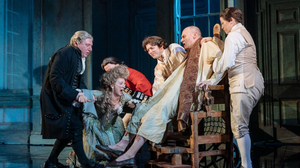Review: THE MADNESS OF KING GEORGE III, National Theatre At Home

![]() In Hamilton, George III has become a more well-known King, albeit portrayed as a comedic figure - the monarch who lost Britain America. In Alan Bennett's thoughtful play, The Madness of King George III, he is depicted as a man who struggles with mental illness, familial betrayal and attempts to usurp his power. After first appearing at The National Theatre in 1991, this enthralling revival was filmed at the Nottingham Playhouse in 2018, directed astutely by Adam Penfold.
In Hamilton, George III has become a more well-known King, albeit portrayed as a comedic figure - the monarch who lost Britain America. In Alan Bennett's thoughtful play, The Madness of King George III, he is depicted as a man who struggles with mental illness, familial betrayal and attempts to usurp his power. After first appearing at The National Theatre in 1991, this enthralling revival was filmed at the Nottingham Playhouse in 2018, directed astutely by Adam Penfold.
In 1788, the monarch was still an essential part of running the state, as he chose the Prime Minister. The play follows the section in George's life after he appointed William Pitt as Prime Minister and proceeded to slide into a terrible mental illness. As the monarch disintegrates, the court is in disarray as various ambitions and power struggles come into play.
The doctors are unlikable and unhelpful forces here, focusing on King's intimate bodily functions, blistering his legs and enforcing a separation between the King and Queen as George deteriorates - which is both unsettling and deliberately brutal. As Parliament attempts to appoint a regent, an unorthodox doctor appears with an alternative way to treat the King.
This is a charismatic cast, led by a blistering performance from Mark Gatiss as the suffering monarch. The first ten minutes or so feel like a Restoration comedy, with Gatiss portraying George as a genial, slightly foppish man. However, he quickly changes the easy breeziness of the character with a visceral and fascinating portrayal of the unravelling of George's mind. It is a very physical performance, with alarming tics and jerking that becomes all the more sympathetic as George is physically restrained in order to try and heal him.
There is such great humanity in his performance, it makes it hard to take your eyes off him. When he is initially strapped to a chair, it acts like some sort of parody of a throne, while "Zadok The Priest" blasts out as a striking soundtrack to his suffering. He thrashes and cries with his face grotesquely distorted; the great monarch is now in agony as the patient. As he slowly recovers, the pain, fear and confusion in his face gradually melt away.
Debra Gillett is excellent as Queen Charlotte. In a time when a woman was defined by who she's married to, she is a forceful and loyal presence, who must have also been remarkably physically strong as she bore no fewer than 15 children.
Wilf Scolding is brilliantly petulant and pouting as the Prince of Wales, more eager to grab power than concerned about his father's wellbeing. Adrian Scarborough is also perfectly cast as the gruff maverick Dr Willis, who eventually treats the King with a version of emerging psychiatry. Louise Jameson is also nicely unlikable as the brutally callous Dr Warren.
Robert Jones's slick design features clever revolving sets that are of constant interest. We are taken almost instantly from the King's bedchamber to the House of Commons, to the other palace rooms. Huge court scenes quickly morph into very intimate spaces.
This is a fascinating and affecting exploration of the fragility of the human condition, as politics, family and position all clash. It is a good play, but Mark Gatiss's performance is why it will stay with you.
The Madness of King George III is on The National Theatre's YouTube channel until 18 June
Photo Credit: Manuel Harlan
Reader Reviews

Videos

